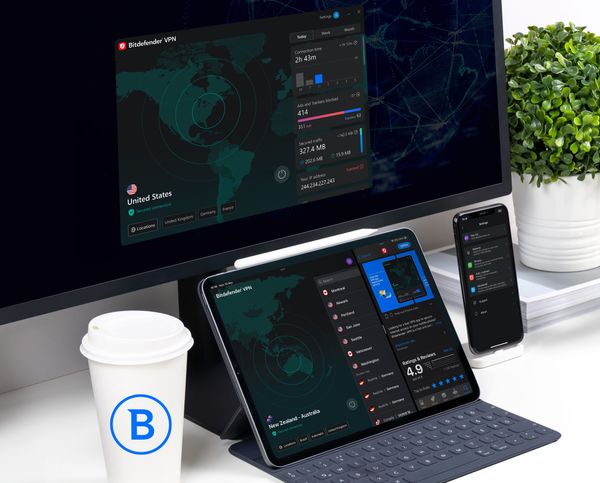5 Tips to Protect Your Privacy While Traveling

Traveling is still atop most everyone’s list of favorite activities, whether for vacationing or work. The sheer thought of packing up and visiting another city or country is exhilarating for many, and it’s not hard to see why.
However, despite the awesomeness, it involves a series of risks that are not immediately obvious to travel enthusiasts, who are often blinded by the excitement of the destination and its attractions.
Travelers are usually cautious about physical risks, such as theft or loss of possessions. But one thing that rarely crosses one’s mind before a pleasant vacation is keeping their digital privacy safe.
Before heading towards your destination, plan and make sure you don’t overlook anything important. We’ve laid down some of the most effective ways you could keep your privacy safe while traveling.
1. Only use secure Wi-Fi Networks (disable auto-connect)
It’s common knowledge that public, insecure Wi-Fi networks can pose risks to your privacy and security, mainly because this type of network is so inclusive, to begin with. Anyone could connect to such a network, including hackers or someone with an agenda.
Sharing a network with their victims deals a mighty hand to cybercriminals. Once they zero in on their targets, threat actors can compromise them in various ways, such as eavesdropping on their communication, stealing private data, and even infiltrating their devices to keep harvesting data, even after the target has left.
One way to ensure this doesn’t happen to you is to avoid using public Wi-Fi networks, especially if they lack security, such as password protection. It’s also best to avoid connecting to hotel Wi-Fi networks with highly visible passwords for anyone (not just the guests) to see and use.
If you have no other choice but to use such a network, consider strengthening the security of your device by relying on specialized services, such as VPNs and antivirus software.
2. Use a VPN
A trustworthy VPN such as Bitdefender VPN can keep your privacy safe by routing your traffic through a secure tunnel, away from prying eyes. On top of that, it encrypts the traffic with military-grade algorithms, making it unreadable to anyone who would find a way to access the secure tunnel and intercept it.
That’s one of the most important reasons why using a VPN on insecure public Wi-Fi networks is paramount to your online privacy. Even if an attacker tries to eavesdrop on your connection, they would only see gibberish if you’re connected to a VPN server.
It’s worth mentioning that VPN doesn’t only shield private communications such as messages or emails, but also critical data, such as login credentials (usernames and passwords), banking information and credit card details.
Furthermore, using a VPN could also help you access blocked websites (depending on the country you’re visiting), VoIP services and online TV platforms.
3. Use HTTPS websites
HTTP is already dated due to its inability to protect relayed information, so most websites embraced the secure version, HTTPS, to protect visitors from privacy violations. Like VPN, HTTPS also relies on encryption to prevent attackers from intercepting data broadcast between a website and its visitors.
This includes messages, emails, sent files, banking information, credit card details and login credentials (usernames and passwords). The rule of thumb is that threat actors won’t be able to decipher data between you and a website if HTTPS is in play.
Modern web browsers, such as Google Chrome, display HTTPS websites differently than HTTP ones. Checking if the website you’re visiting uses HTTPS is quite simple, too; just take a quick look at the address bar. HTTP websites are flagged as Not secure, whereas HTTPS websites display a padlock icon next to the URL.
There’s a common misconception that, since both rely on encryption, VPN and HTTPS should be exclusive. However, HTTPS only encrypts browser traffic, whereas a VPN offers you system-wide protection covering all Internet-enabled apps (Internet browser, email, IM, games). Therefore, the best way to keep your privacy safe is to use a VPN and try connecting exclusively to HTTPS websites.
4. Turn on MFA on your accounts
Deploying additional security layers between your account and an attacker is never a bad idea. Therefore, you should enable and configure Multi-Factor Authentication (MFA) on your accounts whether you’re about to travel or not.
Several types of MFA are available, so choose the one with the highest level of security, such as biometrics, physical security key, or authenticator apps. Note that security questions can often be a liability, given that they can be bypassed through social engineering, so you should avoid using them as MFA.
Receiving an SMS security code on your phone comes in a grey area; while most of the time it’s an effective security measure to keep attackers at bay, SIM swap scams can render it useless. Therefore, you should opt for more secure MFA options, such as those mentioned above.
5. Use a password manager
It’s no secret that people hate memorizing passwords, so they tend to use the same password for several accounts. By doing so, in the event of a successful cyberattack, they provide the threat actor with a skeleton key to most (if not all) of their accounts.
The most obvious solution is to use a different password for each account. However, the human brain can only remember so much, and random passkeys are impossible to remember anyway.
Relying on specialized software, such as password managers, can give you the upper hand, especially if you’re traveling and your accounts are more vulnerable than usual. Password managers let you stash all your passkeys and passphrases into one secure location and access them using a universal password.
While we’re on the topic, it’s also wise to change your password regularly and check whether your credentials have been leaked. Bitdefender Digital Identity Protection can help you by scanning the web for personal data leaks and continuously monitoring if your accounts are exposed.
Keeping your privacy safe while traveling is no child’s play
There are several things to take into account to protect your online privacy while traveling. However, following healthy security practices like those above should help you steer clear of danger on your next trip.
Although each tip is effective on its own, we recommend following them all (or as many as you can) to ensure that your online privacy is safe.
tags
Author

Vlad's love for technology and writing created rich soil for his interest in cybersecurity to sprout into a full-on passion. Before becoming a Security Analyst, he covered tech and security topics.
View all postsRight now Top posts
How to Protect Your WhatsApp from Hackers and Scammers – 8 Key Settings and Best Practices
April 03, 2025
Outpacing Cyberthreats: Bitdefender Together with Scuderia Ferrari HP in 2025
March 12, 2025
Streamjacking Scams On YouTube Leverage CS2 Pro Player Championships to Defraud Gamers
February 20, 2025
How to Identify and Protect Yourself from Gaming Laptop Scams
February 11, 2025
FOLLOW US ON SOCIAL MEDIA
You might also like
Bookmarks








